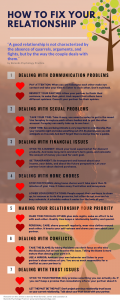Solving relation problems.
Relationship problems are more common than you think. Even the most perfect couples experience relationship problems from time to time. Where the ‘perfect couples’ keep their relationship issues to themselves, other couples show or talk about them more easily to others. Are relationship problems a bad sign?
It is common for two people who spend a lot of time together to get annoyed, frustrated or agitated with each other sooner or later. Everybody has their own rhythm, norms, and values, and whenever another person enters their world, they both need to adjust. Most people manage to adjust for a while and to keep their emotions for themselves. But eventually negative emotions start building up inside a person until they reach a limit. That is the moment when people start lashing out at one-another, start the silent treatment, experience outbursts of anger, become passive aggressive and so on. This is when people start having relationship problems. Every couple has its own problems: intimacy problems, communication problems, jealousy issues, emotional infidelity issues, time management issues, and so on.
At Barends Psychology Practice adult separation anxiety treatment is offered (also online). Go to contact us to schedule a first, free of charge, session. (Depending on your health insurance, treatment may be reimbursed).
How do people get relationship problems?
Having relationship problems is not a bad thing in a relationship. Every healthy relationship encounters problems every now and then. The way relationship problems are being solved, however, is what determines whether or not a relationship is healthy. The inability to solve issues is a problem. Communication, motivation, and paying attention to one another are key ingredients to a healthy relationship. Unfortunately, these ingredients often are taken for granted resulting in miscommunication, frustration, anger, and arguments. Suddenly every comment becomes a discussion and every discussion ends in an argument. How is that possible?
The mechanism behind relationship issues.
The mechanism behind this is more simple than you’d imagine: in the beginning of the relationship you want your partner to like you, so you make an effort. Whenever your partners gives you feedback, you (try to) change a little bit. Your partner accepts you more or less the way you are because your partner also want you to like him/her. The moment you realize that the relationship is steady you make less of an effort and you want to behave the way you feel like. Your partner’s feedback isn’t perceived as feedback anymore, but as criticism. Your partner doesn’t like nor accept it when you don’t make an effort to change anymore. Slowly that feedback (which you now think is criticism) makes you feel like defending yourself (your own norms, values and habits, rituals, and so on). Suddenly you find yourself defending your own ‘island’ (values, norms and so on) and your partner does the same. Instead of growing as a couple, you both are now fighting each other. The purpose of a discussion is to come to a solution, but for you both it became a matter of who wins the discussion.
(Advertisement. For more information, please scroll down.)
Relationship problems can easily be solved, but you need to be motivated, transparent and ready for change.
Below is a list of common relationship problems. Click of each name to go to the self-help page. If you need professional help for your relationship issues, please contact us for a first, free of charge (online) session.
List of relationship issues:
- How to fix a relationship? – page about common relationship issues.
- Tips to improving communication in relationships.
- Dealing with jealousy in just a few steps.
- How to deal with different cultural backgrounds in a relationship?
- Tips to getting over a break up.
- How to overcome infidelity?
- Dealing with fear of commitment.
- How to overcome adult separation anxiety?
- Overcoming trust issues in a few easy steps.
- How to deal with loneliness in a relationship?
- Read more about online marriage counseling.
- Take me to the homepage.

